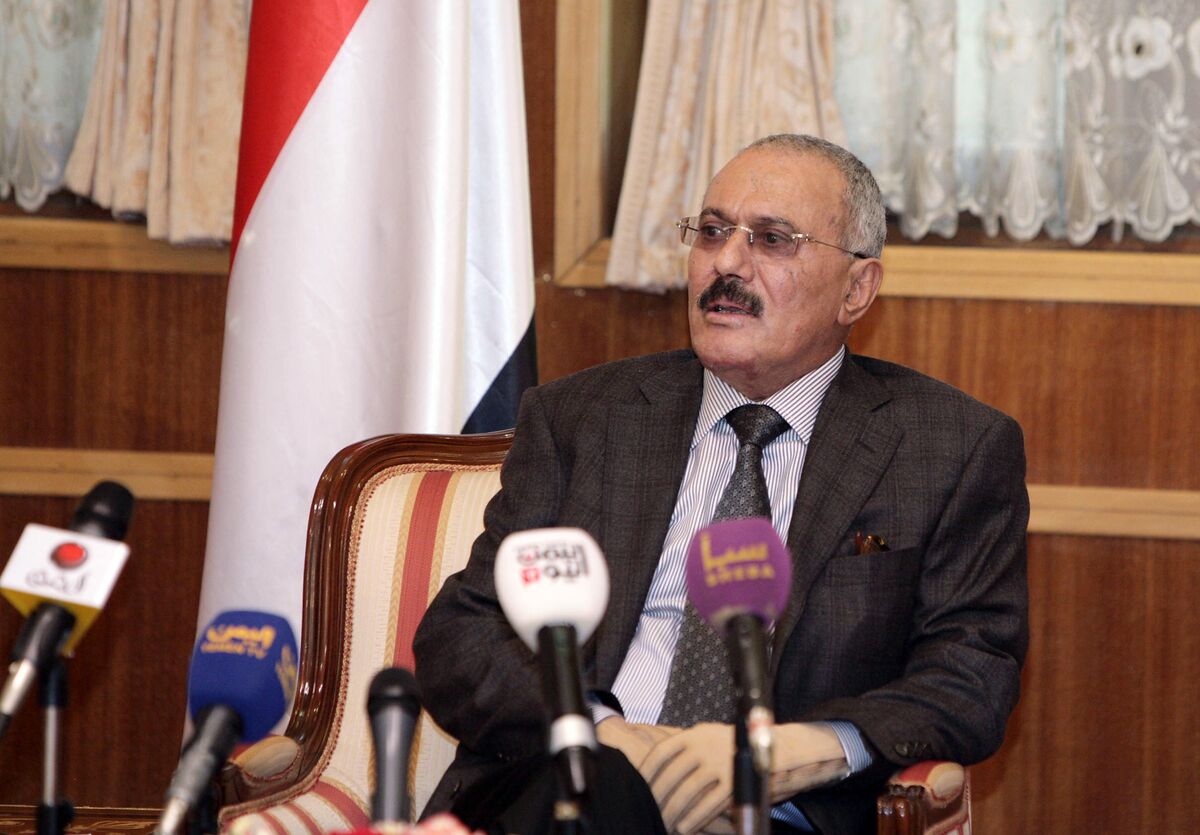
Outgoing Yemeni President Ali Abdullah Saleh speaks to members of the media at the presidential palace in Sanaa on Jan.
Yemen’s Houthis said they killed former Yemeni President Ali Abdullah Saleh, days after he appeared to abandon them in favor of a Saudi-led coalition that has battled the rebels for nearly three years.
The Houthis announced Saleh’s killing in a statement on Monday, calling it “the end of the crisis of the treasonous militia” and claiming to have “complete control” of Saleh’s “hideouts” in the capital and provinces. Videos and photos of his bloodied corpse also circulated on local media.
Saleh’s death, days after he called on Yemenis to rise up against the Houthis, may alter the course of a civil war that has also become a proxy battle in a broader regional struggle between Saudi Arabia and Iran, which backs the Houthis. Saleh’s “towering” position in Yemeni politics mean that “the gloves are off” for the Saudi-led coalition, according to Peter Salisbury, senior research fellow at the Middle East and North Africa program at Chatham House.
“The Saudis have been working towards a deal with Saleh, and with him that was their best chance to take the Houthis out of commission,” Salisbury said by phone, adding that Saleh was the one person who could have allied various factions. “They will do everything possible now to destroy the Houthis.”
Divisions
For the past two years, Saudi Arabia’s southern neighbor has been divided into two camps, with the government of the ousted Saudi-backed elected president, Abd Rabbuh Mansur Hadi, encamped in Aden and the Houthis in control of the capital, Sana’a, and parts of the north. The Saudi-led coalition that formed in 2015 to try to reinstate Hadi has devastated swaths of the country with airstrikes, and al-Qaeda militants have also exploited the chaos to expand their foothold in the Arabian Peninsula.
But the war also marked an extension of the Saudis’ proxy fight with dominant Shiite power Iran, left at least 14,000 killed or wounded and triggered a humanitarian catastrophe, with nearly 1 million people having contracted cholera, and 3 million internally displaced.
Until recently, Saleh had partnered his forces with the Houthis, though the alliance was always a tenuous one because the former president had battled the rebels during his more than two decades in power. Many saw it as a marriage of convenience motivated by his wish to regain the presidency he lost in 2012 during a popular uprising.
Secret Talks
Houthi rebels earlier this year accused Saleh of holding secret talks with the United Arab Emirates, a close Saudi ally and member of its coalition in Yemen. The Houthis said Saleh -- who denied the charge -- crossed “red lines” and denounced his description of them as a militia, a term the Saudis use to challenge their legitimacy.
On Saturday, Saleh called on the Yemeni people to “defend their republic” against the Houthis and urged the Saudis to stop their airstrikes and lift all blockades. The Saudi-led coalition later backed his stance.
Fighting between Saleh’s forces and Houthi rebels escalated over the weekend, with the thud of tank artillery and other heavy weapons piercing the air in Sana’a. Houthi spokesman Mohammed Abdulsalam claimed progress, saying fighters had wrested control of homes belonging to Saleh’s son, Ahmed, and nephew Tarik, the commander of the former president’s forces. Saleh has lived underground since his home was bombed by coalition airstrikes.
The Houthis also said they fired a ballistic missile at a nuclear plant in Abu Dhabi, without providing any evidence to back up the claim. It was denied emphatically by the U.
The split between the Houthis and pro-Saleh forces “appears to set a new stage in the Yemen conflict,” said Ayham Kamel, head of Middle East and North Africa at Eurasia Group, said by phone on Monday. “Saleh supporters are increasingly interested and willing to turn to Saudi Arabia and the U. to expand their influence and power in Yemen.”
Escalating violence could drive Yemen, a precarious nation only reunited in 1990, to completely disintegrate, becoming a failed state perched south of the world’s biggest oil exporter and a major maritime artery. German Foreign Minister Sigmar Gabriel called Yemen the world’s “worst humanitarian crisis” on Monday and said, “we must see what we can do to end this cruel and useless war.”
— With assistance by Ahmed Feteha, and Zainab Fattah.


0 comments:
Post a Comment